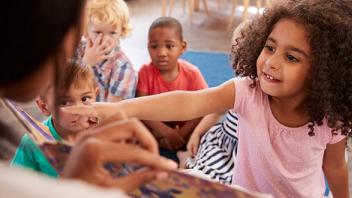Prior to reading any story aloud
- Introduce the story by stating the title, then the author’s name and asking students, “What does an author do?” (Students should respond, “Writes the story.”).
- State the illustrator’s name and ask, “What does an illustrator do?” (Students should respond, “Draws the pictures.”).
- Hold up the book and say, “This is the front of the book, (turn it sideways and state) and this is the spine.” Turn the book to the back cover and state, “This is the back of the book.” Then ask, “Do we begin reading from the front or the back of the book?” (Students should respond, “From the front.”).
- “Let’s look at the picture on the front.”
- Hold up the book with the front cover facing the students. Ask: “What do you think will happen in this story? Remember, I want you to answer using complete sentences.”
Before the reading
- Select vocabulary words from the story that you need to discuss prior to reading the story. Write them on sentence strips or on the board. Discuss the words with students.
- Please note the use of open-ended questions that will require the students to give responses that extend beyond Yes/No answers. Remember to use open-ended questions as you read the story and in your discussion after the reading.
- Encourage students to draw upon what they know about the words from their personal lives. For example, if the word is the verb fish, perhaps some of the children have gone on fishing trips with their parents. Encourage a brief telling of personal stories. Their personal stories allow students to make connections with the text.
During the reading
- Briefly discuss the pictures on each page after reading that page.
- Encourage students to guess/predict what will happen next.
After the reading
- Ask students to tell you if they liked the story and why. Encourage responses in complete sentences. “I liked it when the little girl rescued her friends because it showed that girls can be heroes.”
Reprints
You are welcome to print copies or republish materials for non-commercial use as long as credit is given to Reading Rockets and the author(s). For commercial use, please contact info@readingrockets.org.
